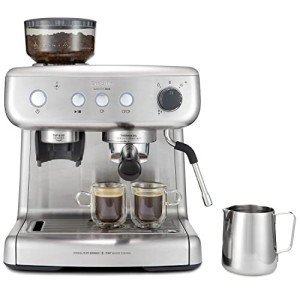Best Espresso Machines: A Comprehensive Guide
Espresso machines have ended up being a staple in coffee culture, attracting lovers and casual drinkers alike. The best shot of espresso can raise the coffee experience, and choosing the best machine is important for attaining this objective. This article delves into the world of espresso machines, exploring a few of the best alternatives available on the market today. It will cover the types of machines, key features to consider, a comparison table, and regularly asked questions.
Types of Espresso Machines
Before venturing into specific products, it's important to understand the various kinds of espresso machines available:
- Manual Machines: Also referred to as lever machines, these require the user to manually control the pressure and circulation of water. They offer a hands-on experience but need more ability.
- Semi-Automatic Machines: These machines automate the pressure and temperature, while enabling users to control the shot timing. They are ideal for those who desire to take control without requiring too much effort.
- Automatic Machines: These devices automate the developing procedure completely; users just select the size and strength of the shot. Great for beginners.
- Super-Automatic Machines: This type grinds the beans, tamps, brews, and even froths milk automatically. They're outstanding for benefit, making them ideal for those who want speed without compromising quality.
- Capsule Machines: Utilizing pre-packaged coffee pods, these are the most basic machines for making espresso. While hassle-free, they frequently lack the depth of flavor found in newly ground beans.
Secret Features to Consider
When browsing for the best espresso machine, a number of essential features must direct your choice:
- Pressure: The ideal pressure for an espresso machine is 9 bars. This pressure is important for extracting tastes effectively.
- Temperature Control: Consistent water temperature level is important for a good espresso. Search for machines with PID (Proportional Integral Derivative) temperature control.
- Construct Quality: Machines made from high-quality materials tend to last longer and provide a better experience.
- Size and Footprint: Consider your readily available counter space. Espresso Machines Under £100 are compact, while others require substantial space.
- Grinder Quality: A built-in grinder uses convenience, however the quality of the grinder affects the last taste. Doser or doserless types change the taste profile significantly.
- Reduce of Use and Cleaning: Consider how easy the machine is to tidy and maintain. Machines with removable parts typically provide simpler cleaning.
Contrast Table of Best Espresso Machines
Here's a comparison table showcasing a few of the most advised espresso machines based on different user reviews and expert ratings:
| Espresso Machine | Type | Pressure (Bars) | PID Control | Grinder Type | Cost Range |
|---|---|---|---|---|---|
| Breville Barista Express | Semi-Automatic | 9 | Yes | Cone-shaped burr grinder | ₤ 600 - ₤ 700 |
| De'Longhi EC155 | Manual | 15 | No | No grinder | ₤ 100 - ₤ 150 |
| Rancilio Silvia | Semi-Automatic | 9 | No | No grinder | ₤ 700 - ₤ 800 |
| Saeco Xelsis | Super-Automatic | 15 | Yes | Integrated grinder | ₤ 1,000 - ₤ 1,500 |
| Nespresso VertuoPlus | Pill | N/A | No | No grinder | ₤ 150 - ₤ 200 |
| Gaggia Classic Pro | Semi-Automatic | 9 | Yes | No grinder | ₤ 400 - ₤ 500 |
Summary of Best Espresso Machines
- For Beginners: The De'Longhi EC155 is an outstanding starting point due to its affordable rate and ease of use.
- For Serious Enthusiasts: The Rancilio Silvia uses a balance in between quality and control, interesting those who wish to improve their barista abilities.
- For Convenience: The Saeco Xelsis stands out as a top super-automatic alternative, perfect for users looking for maximum ease without jeopardizing taste.
Regularly Asked Questions (FAQs)
Q1: What is the very best pressure for extracting espresso?A1: The perfect pressure is 9 bars; this pressure level is ideal for extracting the tastes in espresso.
Q2: How typically should I clean my espresso machine?A2: Regular cleansing is vital. For machines with integrated mills, it is best to clean them after every use. Deep cleansing ought to be done weekly or regular monthly depending on usage and model.
Q3: Can I use regular coffee in an espresso machine?A3: Espresso is made from carefully ground coffee, ideally roasted particularly for espresso. While you can use regular coffee, the taste and extraction might differ.
Q4: How long can my espresso machine last?A4: With appropriate care and upkeep, a high-quality espresso machine can last a number of years, even years.
Q5: What grinder should I use for espresso?A5: A burr grinder is preferable, as it provides consistent grind size which is essential for appropriate extraction.
The journey to discovering the best espresso machine can be an interesting one, filled with discovery and capacity for establishing one's coffee taste buds. Whether going with the simplicity of a pill machine or the control of a manual design, understanding the various types and functions can considerably improve the experience. With advances in technology and development, there's an ideal espresso machine for all choices and skill levels on the market today. Buying Espresso Machines Under £500 promises fantastic flavor but also raises the general coffee experience.

